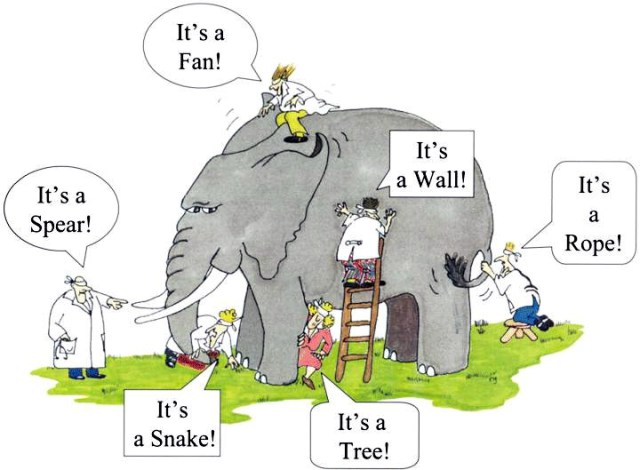Uncommon Alliances
I recently wrote an article about the upcoming Iowa City Council election. I felt it was necessary to explain why I was supporting Rockne Cole — a candidate who has opposed all the development projects and TIF awards that I’ve supported over the past few years.
As you’ll read in the article, it’s not so much what Rockne’s politics are, but how Rockne’s politics are, that earned my support. We disagree on some issues. Yet, Rockne is the nicest person you’ll ever disagree with.
Rockne is largely opposed to TIF usage, I’ve written in favor of controlled TIF use. Rockne was opposed to the Park@201 project. I wrote a lengthy article defending Park@201 and it’s developer. Yet there are also many things that Rockne and I agree on which make him appealing as a City Council member. Take a look at my article and his website to learn more.
I believe we can create value through uncommon alliances. Keep reading further to learn more about what I mean.
Building a Better Democracy
It’s always been important to me to have people in my life who challenge my views and ideas. I feel it helps me make better, more informed decisions. It motivates me to dig deeper into issues. It helps me find possible faults or weaknesses in my own positions.
In government, governance, and politics, whether at the local level or higher, I think we all realize the value of diversity. As long as people can be civil, it’s really valuable to have a mix of opinions and viewpoints.
You may be familiar with the parable of the blind people and the elephant. The illustration below conveys the basic message of the parable. In the Jain version of the story there are six people. Other versions have only four people.

Faith in Democracy is to trust that if we work together, intentionally bringing together representatives of diverse views and agendas, we can arrive at a better understanding and help build a better world. We can be united despite our differences.
As Pope Francis has stated:
“It sometimes happens that complete information is not put on the table; a selection is made on the basis of particular interests, be they politico-economic or ideological. This makes it difficult to reach a balanced and prudent judgement on different questions, one which takes into account all the pertinent variables. Discussions are needed in which all those directly or indirectly affected…can make known their problems and concerns, and have access to adequate and reliable information in order to make decisions for the common good, present and future.” ~ Pope Francis, quote from Laudato Si — On Care for Our Common Home (see on Google Books)*
We all need each other. We’re all responsible for one another. The video below illustrates this principle.
So, with these things in mind, I feel it’s important to build a diverse City Council for Iowa City that reflects and represents all members of our community.
Self-Limited Political Influence
I have several businesses that I’ve built up over the years, and those have also grown into various newsletters and social networks. In addition, there are the real-world relationships that have developed over time. I’m hesitant to use these connections and resources for potentially polarizing political causes. First of all, the people who’ve helped me succeed over the years are very diverse — conservative, liberal, religious, non-religious, wealthy, minimum wage earners, etc.
It’s one thing to take a position as a business owner, but to use the business influence, resources, and connections as a platform for advancing certain political causes is something to be careful about. Although not a formal co-op, I maintain the belief that much of what I have, that was collectively built, should be considered collectively owned. I wouldn’t want to fully and unreservedly use the entirety of my collective resources to promote anything that isn’t universally accepted. So, mostly I promote things like education, wellness, racial justice, and sustainability that just about everyone agrees on.
What I’m left with is the belief that the best thing I can do is to foster greater public engagement in the democratic process by informing, inspiring, and motivating people to be involved. I try to add my own voice and opinions along the way, but mainly I don’t want to see any group or individual silenced, marginalized, or ignored.
In forming my own opinions, and refining them, I try to check-in with others who are ‘examining the elephant’ of the world around us.
I’m not one of the billionaire class, but if I were, I’d like to think that I would choose to have roughly the same political influence as the average citizen. I wouldn’t want use my billions to hijack the democratic process, because I know that we’re all blindly trying to understand what the world is about, and only together, through listening to one another, will we come to a more clear understanding.
This is why, I expend the surplus of my time, energy, and resources on infusing the democratic process and getting more people involved.
We’re all at Risk of Being Insular and Isolated
It’s the nature of our day-to-day life and work to be somewhat insular. Unless we’re intentional about reaching out to ‘the other’ we will mostly be surrounded by people who think and live how we do. I’m a business person, so when I hear that 63 downtown business owners, are collectively endorsing Tim Conroy, Scott McDonough, Rick Dobyns, and Michelle Payne, I understand that. I ‘get’ it. I might be endorsing that group of candidates too if I had a downtown business.
As a business owner, many of the people I interact with as friends or clients are business owners (many of them downtown). My main base of customers are people who can afford typical consulting rates for technology support. They aren’t minimum wage earners.
I don’t think the downtown business owners are intentionally organizing as a monolithic voting block to prop-up downtown business-friendly candidates out of an effort to gain a controlling majority of our local city’s governance and thus ensure future TIF money to be invested downtown. Instead, I think what’s happening is that people tend to join with others who have similar interests, and when they join together they probably vote similarly.
Downtown business owners live in our neighborhoods and have the same interests we do — with the added understandable incentive to see more tax money invested into the downtown area. That makes total sense.
How Can the Average Person Have Influence?
For about 5 to 10 hours of consulting time work per week, I offer a sliding scale and do some volunteer work for people and local public interest groups who are on a limited budget. This helps me connect with a broader and more diverse group of people than I might otherwise meet. I tend to do my own informal poling of people to get an idea of what public opinions are on various topics, and I’m often surprised by what I learn. It helps broaden my understanding.
When I heard about the 63 downtown business owners endorsing the establishment-approved candidates, it made me think that it would be hard for the average person to influence local politics.
For our local City Council election, there’s a $100 limit on what a candidate can receive from any one supporter. That $100 is less of a sacrifice for those who have means. So, wealthy supporters of candidates are not as strained when giving. Furthermore, people who are ‘connected’ have resources that can help them have a greater impact. Their friends and supporters also have resources. In other words, 63 business owners will have more influence in local politics than 63 minimum wage earners. Despite there being a $100 limit on cash giving, the impact a wealthy person is potentially greater than the impact that a person without means or connections can have. In addition, many low income laborers (the working poor) maintain two or more jobs, so they aren’t even able to volunteer much time to any campaign.
For these reasons, I look for ways to level the playing field and give people a greater voice who might otherwise be marginalized and ignored. Returning to the elephant parable, it’s not enough to have diversity of viewpoints. We must also do what we can to make sure that the diversity of voices are heard, listened to, and genuinely considered.
Thank You
I want to thank everyone who continues to support me personally as well as those who support my various businesses. My goal is always to promote fairness, inclusion, clarity, and dialog.
~ Greg
Document History
The above article was originally written on 31 Oct 2015 at 12:05 PM. It was updated on 31 Jul 2022 to convert it to WordPress content blocks format. The embedded Vimeo video was updated for the new block layout.

